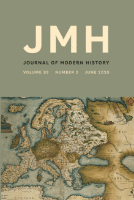
JOURNAL OF MODERN HISTORY
Scope & Guideline
Unraveling the Past, Shaping the Future
Introduction
Aims and Scopes
- Modern European History:
The journal focuses on the political, social, and cultural developments in Europe from the early modern period to the present, examining how these events shape contemporary societies. - Interdisciplinary Research:
It encourages interdisciplinary approaches, integrating insights from political science, sociology, cultural studies, and economics to provide a more nuanced understanding of historical phenomena. - Global Perspectives:
The journal emphasizes a global context for European history, exploring transnational connections and the impact of colonialism, migration, and globalization. - Cultural and Social History:
There is a strong focus on cultural and social history, including studies on identity, memory, gender, and the roles of various communities in shaping historical narratives. - Historiographical Debates:
The journal engages with historiographical debates, offering critical analyses of different historical interpretations and methodologies.
Trending and Emerging
- Postcolonial Studies:
An increasing number of articles examine the legacies of colonialism and postcolonial identities, reflecting a growing interest in how colonial histories shape current global dynamics. - Environmental History:
Environmental history is gaining attention, with studies focusing on the interplay between historical events and environmental changes, highlighting the impact of climate and ecology on societal developments. - Gender and Sexuality Studies:
There is a notable trend towards exploring gender and sexuality in historical contexts, emphasizing the roles of women and LGBTQ+ communities in shaping historical narratives. - Memory Studies:
Research on collective memory and the politics of remembrance is becoming more prominent, exploring how societies remember and interpret past traumas and conflicts. - Digital History and New Methodologies:
The incorporation of digital tools and methodologies in historical research is emerging, as scholars utilize digital archives, data visualization, and online platforms to enhance their analyses.
Declining or Waning
- Traditional Military History:
There appears to be a declining focus on traditional military history as a standalone discipline, with fewer articles dedicated solely to battles and military strategies, reflecting a broader trend towards social and cultural history. - Eurocentric Narratives:
There is a noticeable decrease in purely Eurocentric narratives, as the journal increasingly incorporates global perspectives, indicating a shift towards more inclusive historical examinations. - Biographical Studies of Historical Figures:
The prevalence of biographical studies on prominent historical figures has diminished, suggesting a move towards thematic and collective histories rather than individual narratives. - Economic History as a Separate Field:
While economic history remains important, its treatment as a distinct area seems to be declining, as economic factors are now more likely to be integrated into broader social and cultural analyses. - Focus on Political History:
There has been a reduction in articles solely focused on political history and party politics, with a trend towards examining the interplay between political events and social movements.
Similar Journals
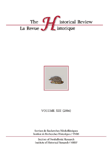
Historical Review-La Revue Historique
Advancing Historical Scholarship, One Article at a Time.Historical Review-La Revue Historique, published by the NATL HELLENIC RES FOUNDATION, is a premier open-access journal focusing on the multifaceted field of history. Established in 2004 and operating out of Greece, this journal serves as a platform for the dissemination of scholarly research, critical essays, and innovative perspectives on historical events, figures, and themes. Though it has transitioned through different stages in its indexing, including a hiatus from Scopus coverage between 2009 to 2021, it has successfully maintained its presence in the academic community, evidenced by its current Q4 classification in the history category of Arts and Humanities. With an ISSN of 1790-3572 and an E-ISSN of 1791-7603, the journal continues to foster rich academic dialogue and inquiry, making research accessible to a wider audience. As a valuable resource for researchers, educators, and students, Historical Review-La Revue Historique contributes significantly to the understanding and appreciation of historical narratives and methodologies.
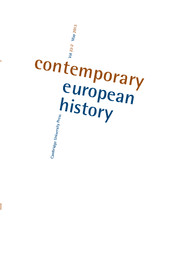
Contemporary European History
Shaping Understanding of Recent Historical DynamicsContemporary European History is a leading academic journal dedicated to the exploration of significant historical events across Europe from 1992 to the present, published by Cambridge University Press. As a Q1 rated journal in the field of History, it boasts a robust impact factor, reflecting its high citation frequency and prominence among scholars. The journal serves as an essential platform for researchers, professionals, and students interested in contemporary issues and trends affecting Europe, promoting interdisciplinary dialogue and the exchange of ideas. With its commitment to high-quality scholarship, Contemporary European History provides insightful analyses that shape our understanding of recent historical dynamics, making it a vital resource for anyone looking to delve into the complexities of modern European history.

HISTORICAL REFLECTIONS-REFLEXIONS HISTORIQUES
Fostering Critical Perspectives on Historical NarrativesHistorical Reflections / Reflexions Historiques is a pivotal academic journal in the field of history, published by Berghahn Journals. Established to provide a platform for innovative historical scholarship, the journal offers a unique blend of theoretical discussions and empirical studies that critically engage with new interpretations and methodologies. With a robust reputation evidenced by its category ranking in the 2023 Q3 History quartile and a Scopus ranking of #1164 in the Arts and Humanities, Historical Reflections serves as an essential resource for researchers, professionals, and students alike. Although the journal is not available through open access, it contributes significantly to historical discourse through its diverse range of articles, fostering a deeper understanding of past events and their implications for the present and future. As it continues to evolve from its inception in 1977 to the present day, Historical Reflections remains committed to advancing the field through rigorous analysis and scholarly debate.

Journal of Modern Russian History and Historiography
Engaging with the Dynamics of Russia's Historical NarrativesJournal of Modern Russian History and Historiography, published by BRILL, serves as a vital platform for scholars engaging with contemporary topics in Russian history and historiographical methodologies. With an ISSN of 1947-9956 and E-ISSN of 2210-2388, this esteemed journal is indexed in fields that reflect the evolving landscape of historical research. Based in Germany and recognized for its academic rigor, the journal stands in the Q4 quartile in both the Arts and Humanities and History categories as of 2023. Despite its challenges in SCOPUS rankings, the Journal of Modern Russian History and Historiography continues to be essential for researchers, professionals, and students alike, fostering critical discourse on modern Russian narratives and historiographical practices. The journal seeks to publish innovative articles that enhance understanding of Russia's historical context and the dynamics of its historiography, making it a valuable resource for those studying or working in this field.

HISTORIA MEXICANA
Cultivating Knowledge on Mexico's Historical JourneyHISTORIA MEXICANA is a prestigious academic journal published by the COLEGIO DE MEXICO CENTRO DE ESTUDIOS HISTORICOS that has been an open access resource since its inception in 1967. With an ISSN of 0185-0172 and an E-ISSN of 2448-6531, the journal serves as a vital platform for scholars dedicated to the exploration of historical studies, particularly focusing on Mexico and its broader context within Latin American history. As a testament to its scholarly impact, HISTORIA MEXICANA is ranked in the Q3 category in History according to the 2023 metrics and holds a Scopus rank of #582 out of 1760 in Arts and Humanities. This journal not only fosters rigorous academic discourse but also provides a unique repository of knowledge, bridging gaps in historical research and inspiring future studies in the field. Researchers, professionals, and students alike will find this journal an invaluable resource for deepening their understanding of Mexico's rich and complex past.

Journal of Belgian History-Revue Belge d Histoire Contemporaine-Belgisch Tijdschrift voor Nieuwste Geschiedenis
Navigating the Complexities of Belgium's PastThe Journal of Belgian History-Revue Belge d'Histoire Contemporaine-Belgisch Tijdschrift voor Nieuwste Geschiedenis is a prominent academic publication dedicated to the exploration and analysis of contemporary Belgian history. Published by SOMA-CEGES, this journal serves as a vital resource for researchers, professionals, and students alike, providing a platform for scholarly discourse and the dissemination of innovative research in the field. Despite its historical significance, the journal faced a hiatus in its Scopus coverage from 2019, yet it retains a strong identity within the Arts and Humanities category, holding a Scopus rank of #1123 out of 1328, placing it in the 15th percentile. This underscores the opportunities for growth and impactful contributions within the journal's scope. By focusing on the intricacies of Belgian history, the journal encourages rigorous investigation and a deeper understanding of Belgium's past, making it an essential reference for anyone interested in European historical narratives.
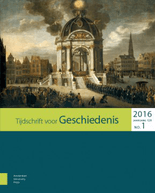
TIJDSCHRIFT VOOR GESCHIEDENIS
Fostering Dialogue on Historical InsightsTIJDSCHRIFT VOOR GESCHIEDENIS is a prestigious academic journal published by WOLTERS-NOORDHOFF B V, dedicated to the field of history. With its ISSN 0040-7518 and an established reputation in the Netherlands, this journal serves as a vital platform for researchers, professionals, and students to disseminate and engage with significant historical scholarship. The journal's impactful contributions have earned it a commendable Q2 category ranking in the history field for 2023, placing it in the top tier of history journals according to Scopus. Although not open access, TIJDSCHRIFT VOOR GESCHIEDENIS offers invaluable insights into various historical topics spanning from its converged years starting in 1983 through to 2024. This enduring commitment to scholarly excellence fosters robust academic discourse and acts as an essential resource for those engaged in historical studies.
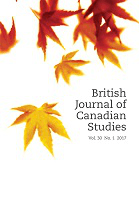
British Journal of Canadian Studies
Engaging with Canada's Past, Present, and FutureThe British Journal of Canadian Studies, published by Liverpool University Press, serves as a vital platform for the exploration and dissemination of scholarly research related to Canadian studies, spanning the domains of cultural studies, history, literature and literary theory, and sociology and political science. Despite its Q4 ranking across multiple categories in the 2023 journal metrics, it offers a unique perspective on Canadian issues and engages with contemporary debates in these fields, making it a valuable resource for researchers, professionals, and students alike. By facilitating discussions that connect various disciplines, this journal encourages interdisciplinary inquiries and cross-cultural comparisons that enrich the understanding of Canada in a global context. Although the journal is not open access, it is poised to make a significant contribution to scholarship in these areas from its base in the United Kingdom.
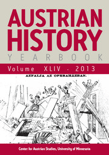
Austrian History Yearbook
Navigating the Complexities of Austrian HistoryAustrian History Yearbook is a leading academic journal published by Cambridge University Press, focusing on the rich tapestry of Austrian history and its intersections with broader European narratives. With its ISSN 0067-2378 and E-ISSN 1558-5255, the journal has carved a niche within the academic landscape since its inception, offering insightful research and analysis that spans various periods and themes in Austrian history. Rated in the Q2 category for History in 2023, and boasting a respectable Scopus rank of #564 out of 1760 within the Arts and Humanities field, the Austrian History Yearbook stands out as a vital resource for historians, researchers, and students alike. The journal aims to promote scholarly discourse, foster critical engagement with historical texts, and contribute significantly to the historiography of Austria and its role in European history. With access options providing a gateway to an extensive repository of scholarly works, the journal serves as an essential platform for advances in historical research, making it indispensable for a global audience keen on understanding the complexities of Austrian heritage.
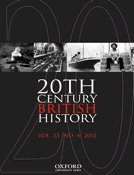
Twentieth Century British History
Illuminating Britain's past for a brighter future.Twentieth Century British History, published by Oxford University Press, stands as a pivotal scholarly journal in the field of historical research, specializing in the rich tapestry of British history during the twentieth century. With an esteemed impact factor and a notable position within the top Q1 quartile of history journals, it ranks impressively in the Scopus database, securing the 234th position out of 1,760 journals in Arts and Humanities, placing it in the 86th percentile. This rigorous academic platform, active since its establishment in 1990, not only contributes to the sophistication of historical discourse but also encourages interdisciplinary dialogue among historians, sociologists, and cultural studies scholars. Though it does not currently offer open access options, the journal provides invaluable insights, critical analyses, and innovative perspectives aimed at enriching the understanding of Britain’s past and its implications for contemporary society. Researchers, professionals, and students alike will find Twentieth Century British History an essential resource for exploring and appreciating the complexities of modern history.